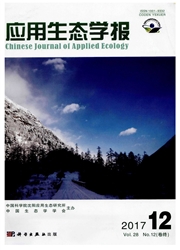

 中文摘要:
中文摘要:
休眠卵是桡足类的重要生存策略,其在沉积物中的丰度对水体种群的补充具有重要意义.干塘是池塘养殖管理的重要措施,对池塘生态系统具有重要影响.2014年2月15日(干塘前)和3月2日(干塘后),分别采集广州市南沙区养殖池塘内表层沉积物,研究沉积物中桡足类休眠卵对浮游种群的潜在补充及影响因素.结果表明:干塘前未冷藏沉积物样品在盐度20时的潜在补充量和孵化率最高,4℃冷藏4周后最高值出现在盐度为15的处理组.干塘后未冷藏沉积物样品在盐度15时的潜在补充量和孵化率最高,冷藏4周后最高值出现在盐度为20的处理组.这说明干塘前桡足类休眠卵的潜在补充量显著高于干塘后,且干塘对沉积物中休眠卵的持续孵化时间有影响.
 英文摘要:
英文摘要:
The formation of resting eggs is an important survival strategy for copepods. The abundance of resting eggs in sediment is of great significance to the recruitment of copepod population in aquatic environment. Desiccation is an important approach of aquaculture management in ponds,which has great influences on pond ecosystem. Surface sediments of aquaculture ponds in Nansha,Guangzhou were sampled before( 15 thFeberary 2014) and after( 2ndMarch 2014) the desiccation separately to explore the potential recruitment of resting eggs into planktonic copepod population,and environmental factors influencing the hatching success of copepod resting eggs. Results showed that without desiccation and cooling,the highest potential recruitment and immediate hatching rates of resting eggs were observed at the salinity of 20 experimental group,while after cooling to 4 ℃ for four weeks,the hatching rate was highest at the salinity of 15. When exposed to desiccation,the highest potential immediate recruitment and hatching rate of resting eggs were observed at the salinity of 15,while after cooling to 4 ℃ for four weeks,the highest hatching rates were observed at the salinity of 20. It was concluded that desiccation reduced the potential recruitment of resting eggs in sediment significantly( P0.05),and desiccation had a negative impact on their hatching duration.
 同期刊论文项目
同期刊论文项目
 同项目期刊论文
同项目期刊论文
 期刊信息
期刊信息
